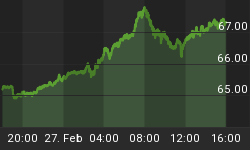The old Dickens quote "It was the best of times, it was the worst of times" is pretty much always applicable to a world as big and complex as this one. But lately, as the disparity between financial markets (best of times) and geopolitics (worst) has grown to almost comical proportions, Dickens has been sounding even more apropos than usual. To take just a few "worst of times" examples:
- Palestinians are shooting rockets at Israel, which is responding with a full-scale invasion that will end up killing many hundreds, including an appalling number of kids.
- A coalition of Islamic radical groups called Islamic State for Iraq and Syria (ISIS) is grinding towards Iraq's capital, home of the small city that is the US embassy. What we'll do should it be taken is anybody's guess, but odds are it won't be pretty. Meanwhile, Iraq's Christians are the largely-unnoticed victims of the fundamentalist resurgence.
- Someone using advanced anti-aircraft missiles shot down a civilian passenger jet over Ukraine, and Russia, Europe and the US are making all kinds of threats and counter-threats as they try to apportion blame. There are an awful lot of soldiers in a small space, and the press is now full of "Archduke Ferdinand moment" kinds of analysis.
Meanwhile, global growth isn't looking so hot. See World GDP Hopes Are Collapsing, which comes with this dramatic chart:

Now, contrast this dark vision with the financial markets, where the picture has literally never been brighter. The US on Wednesday July 23: Stocks mostly higher; S&P 500 in record territory.
And that's the tame part of the equities world. Emerging market stocks are absolutely soaring. See: EMERGING MARKETS-Indonesia, Russia gains push emerging stocks to new 17-mth high.
So what's happening? One would think that rational investors would be cautious about buying volatile assets like stocks when there are so many geopolitical landmines just waiting to blow up -- and when global growth is failing miserably to meet economist expectations. Instead they're buying with abandon.
One possible explanation is that the world's major economies continue to flood the financial system with credit which has to go somewhere. And with bonds yielding next to nothing, equities (and real assets like San Francisco houses and fine art) are getting the bulk of it.
China's runaway train of an economy is exhibit number 1. See China's debt soars to 250% of GDP:
China's debt has soared to two and a half times its economy, Standard Chartered estimates, highlighting the difficulties Beijing faces in balancing growth with the risk of bubbles forming in its economy.
Total financial credit has surged to 251 percent of gross domestic product from 147 percent at the end of 2008, the bank said.
The article contains a must-watch interview with a guy from Motley Fool who asserts, among other things, that China can borrow as much as it wants because it owes the money to itself, and if it eventually needs to ease its debt burden it can just devalue its currency and/or mandate higher consumer spending.
This is from the "current trends will continue forever because the government will make it so" school of thought that typically marks the end of a given binge. When people can no longer rely on fundamentals to make their case, they turn to the delusion of omnipotent powers-that-be. Just go back to the dot-com and housing bubbles for tons of such assertions from now-mostly-forgotten pundits.
To repeat something that's heard a lot these days, it's 2007 all over again, and 2008 can't be far off.















